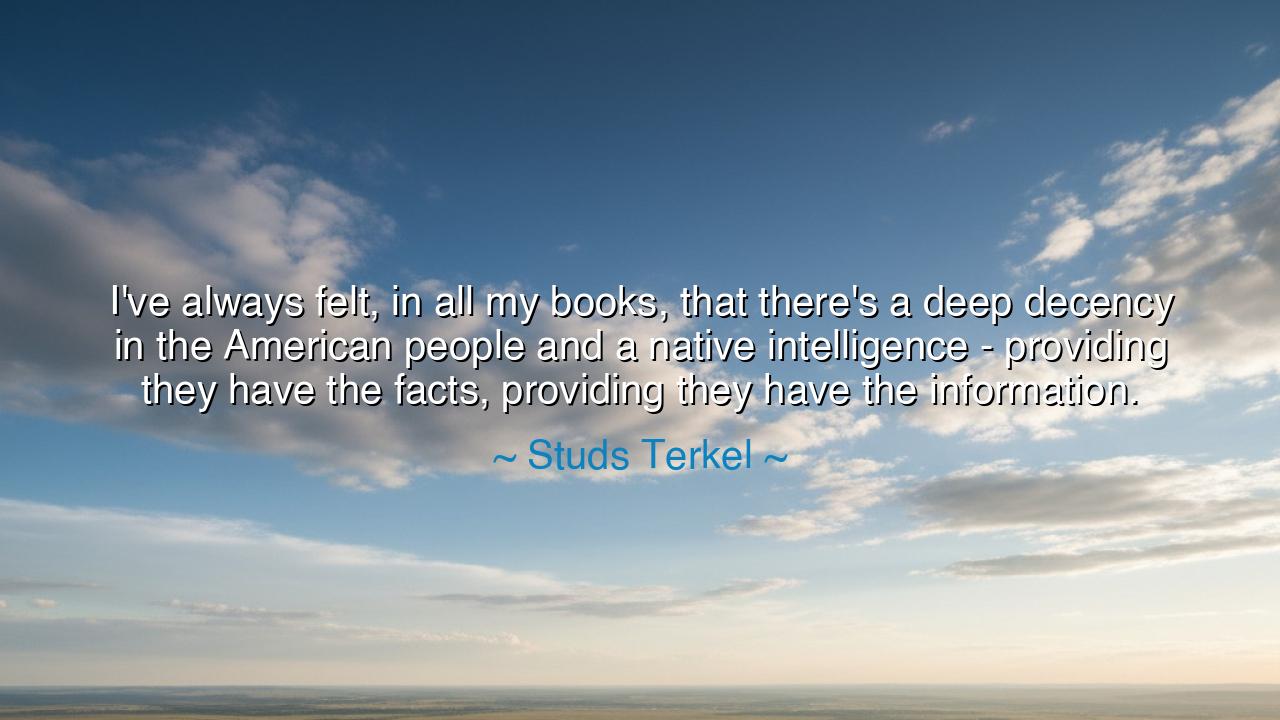
I've always felt, in all my books, that there's a deep decency in
I've always felt, in all my books, that there's a deep decency in the American people and a native intelligence - providing they have the facts, providing they have the information.






When Studs Terkel, the great chronicler of American voices, declared, “I’ve always felt, in all my books, that there’s a deep decency in the American people and a native intelligence—providing they have the facts, providing they have the information,” he spoke not only as a historian of his time but as a philosopher of humanity. His words rise like a hymn to the common man—the worker, the teacher, the farmer, the dreamer—those who build a nation not through power, but through perseverance and heart. In this quote, Terkel captures a truth as old as democracy itself: that the strength of a people lies not in their rulers, but in their capacity for reason, their moral decency, and their access to truth.
Terkel spent his life listening. His books, such as Working, Hard Times, and The Good War, are filled not with the voices of the mighty, but of the ordinary—the anonymous millions who toil, struggle, and hope. He believed that within every individual, no matter how humble their station, there existed a native intelligence—a wisdom born of experience, of empathy, and of survival. Yet he also knew that this intelligence could only flourish when nourished by truth. “Providing they have the facts,” he said—for without truth, even the wisest heart may stumble into ignorance. This was not merely a statement about America; it was a statement about humanity. Where information is withheld, fear grows; where light is dimmed, even decency can be misled.
To the ancients, truth was sacred. The Greeks called it aletheia—the unveiling, the bringing-forth of what is hidden. They believed that to know truth was to live rightly, and that the distortion of truth led to moral decay. In the same spirit, Terkel warns that information is the breath of democracy. The people, he insists, are not foolish or cruel by nature. But if the channels of truth are poisoned—by propaganda, by greed, by indifference—then even the noblest hearts may be led astray. He understood that knowledge is the foundation of justice, and ignorance its undoing.
History bears witness to this principle. Consider the story of Franklin D. Roosevelt during the Great Depression. When despair swept across the nation, Roosevelt did not retreat behind walls of secrecy or power. Instead, he spoke directly to the people through his fireside chats, explaining the crises in plain language, giving them the facts. He treated the people as partners in recovery, not as children to be soothed or deceived. And the result was miraculous: trust was restored, courage rekindled, and the spirit of the nation revived. This is the very essence of what Terkel meant—a belief in the decency and intelligence of the people, when given the truth.
Terkel’s faith was not naïve. He had lived through the tempests of war, McCarthyism, and civil unrest. He knew the flaws of his country as intimately as its virtues. Yet even in the darkest times, he never surrendered his belief that ordinary people, when armed with truth, would choose compassion over cruelty, cooperation over corruption. His books are filled with stories of factory workers who sacrificed for their families, of soldiers who questioned the morality of war, of citizens who stood for justice when silence would have been easier. Each voice became a testament to his conviction that decency and intelligence are not the privilege of the elite, but the inheritance of all.
The deeper meaning of Terkel’s quote reaches beyond the borders of America. It speaks to every society, in every age, where truth struggles against the shadows of deceit. It reminds us that a people’s moral strength cannot be sustained by wealth or technology alone, but by their collective ability to discern truth, to think critically, and to care for one another. The facts are the light that guides this moral compass; without them, civilization drifts into darkness.
So let this wisdom be carried forward: seek truth, and share it. Question not to destroy, but to understand. Listen to others—not only to those who speak loudly, but to those whose voices tremble in the margins. For in their stories lies the heartbeat of humanity. Like Terkel, cultivate faith in people’s better nature—but remember, faith must be fed by knowledge. Strive to be both decent and informed, for these two virtues together build the only kind of world worth living in.
In the end, Studs Terkel’s words remind us that democracy is not a gift but a trust—a sacred bond between truth and the people. The native intelligence he spoke of still dwells within us, waiting to awaken wherever light is shed. Let us therefore be both students and guardians of truth, so that the decency he saw in humankind may not merely survive, but shine, generation after generation.






AAdministratorAdministrator
Welcome, honored guests. Please leave a comment, we will respond soon